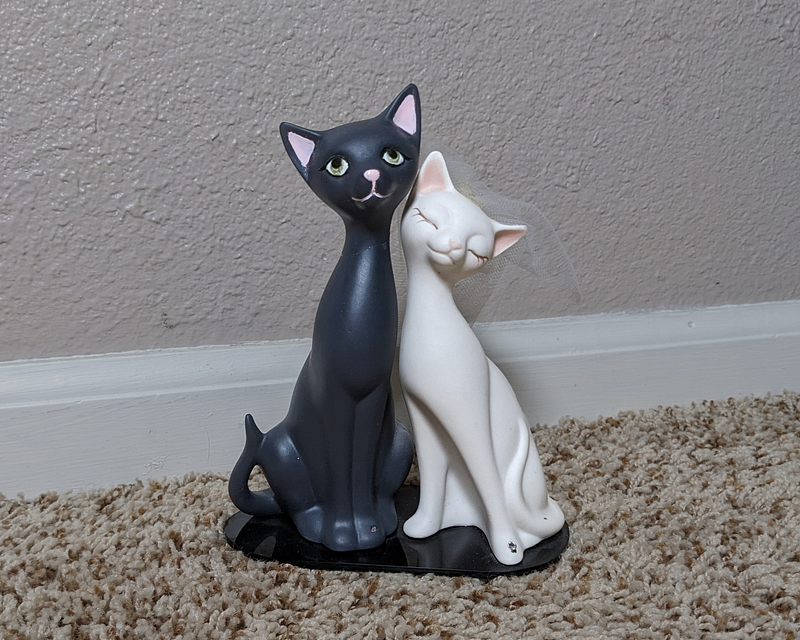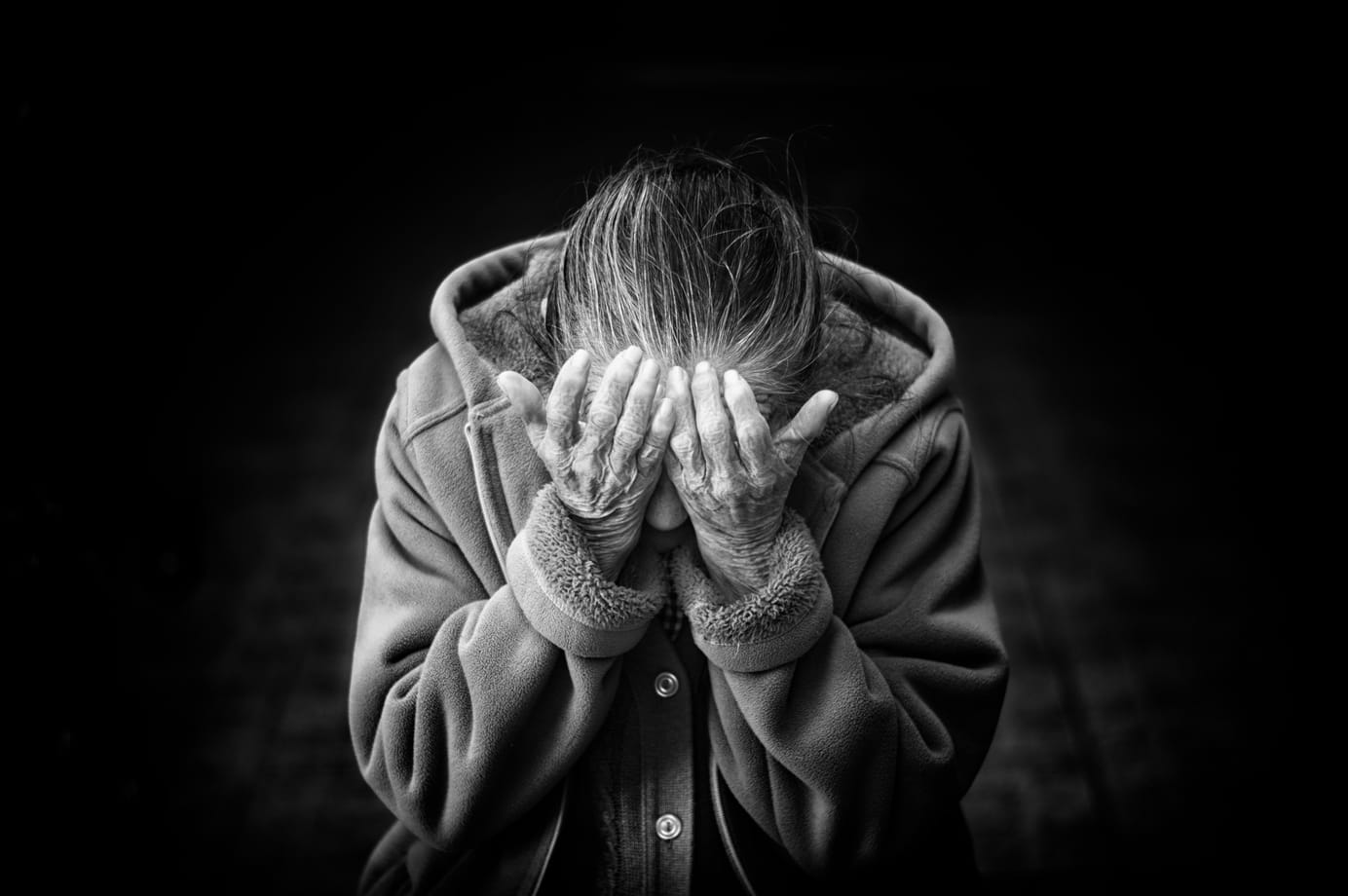Should We Know Our Gender Implicitly?
How much knowledge of the Self can be reasonably expected from a US Citizen?


Now that the Great Cake Topper Cleaving of 2023 is in the past, I reflected back on something I said to my wife while crying about it.
The cake topper broke because four men — in the process of replacing the siding on our house — were banging simultaneously on exterior walls with hammers and nail guns, shaking the walls sufficiently to knock books off shelves. One book fell on the cake topper, breaking the head of the black cat (above) at the neck.
What I sobbed to my wife is that I “should have known” the damage would occur and taken action to move the cake topper, as it was so dear to me.
What a load of horse shit.
This incident taught me a major obstacle to my development — bemoaning the “should have known.” I suspect there are memories of my father buried deep within to unpack and reprocess. The first lesson, however, is that there will always be mysteries of the Universe we cannot understand, including the foibles of siding installation.
I am extremely content having socially transitioned gender in the past year (despite several whiny articles to the contrary recently). However, given how right I felt presenting as a woman almost four decades ago, you’d think I’d know transition was the best course for my life before now.
More generally, I know people diagnosed by a mental health professional with gender dysphoria who say they should have known about their gender…but how much sense does that make? I mean, I knew very well I was a woman very long ago, but it took 52 years before I transitioned. Are the two any different?
Teenage identity crisis
In a response I received recently, a writer believed normal humans solidify their identity early in life. He referenced Erik Erikson’s stages of growth to posit anyone still questioning identity outside of the teenage years are psychologically stunted.
Now, I hope I’ve made clear I do not consider “common and frequent” as the definition of “normal.” However, most people I know (transgender or otherwise) have not completely explored their identities. So — in the interest of science, let’s ask the question: why would identity not be solidified early in life?
My first thought follows from any variant of “it was harder / easier in Ye Olde Dayes than it is today.”
I have claimed life was harder because so much more physical work was necessary, and there was little time to worry about identity. Society as a whole had less time for recreation, including to sit and navel-gaze (as my dear friend Georgette Cornio called it).
But life in Ye Olde Dayes certainly could have been easier — society also had fewer expectations. Children didn’t “have to” go to college, go to grad school, get a job, get a promotion, or start their own business. In the meantime, don’t forget to work in marriage, buying a house, having children, and indoctrinating those children in the burning expectations to follow suit.
Like Yu-Gi-Oh cards, society’s expectations have undergone a “power creep” over the past two centuries.
Survival of the teenager
But we are all society. If we want to change beliefs in society, we change our own and live our lives with them.
The American Dream is pervasive. It was baked into my psyche and is very difficult to remove. Every decision I made in life was first weighed carefully against income, social status, future gains — yes, even the decision that unlocked my true self and the path toward contentment and away from self-immolation.
But that action — self-preservation and the ability to co-exist in a community — was the same 1000 years ago as it is now. Are there more career choices today? Yes, of course. But was the struggle to survive any different in kind 1000 years ago?
No — survival across the millennia has been exploration of identity.
To return to Erik Erikson and developing identity, he believed identity was developed throughout life. The process doesn’t stop at any age. I will take it further to say developing identity doesn’t stop after any external development in one’s life situation, either.
I spent 9 years in college and graduate school, ditched chemistry for software, ditched writing software for managing software teams, then — after discovering the American Dream is poison — threw it all in the bin to write.
Clearly, I haven’t known who I am.
Identity is eternal
But wait…
There are tendrils of my identity that remained constant: a love of learning, a love of teaching, and the knowledge I am a woman.
I look back now and see the choices I made reflected my identity. Social skills are hard? Playground bullies are just jealous of my softer, kinder nature. Computers are hard? Be a biologist (it was where the girls were, anyway). Constant grind of producing code wears me down? Nurture others to produce code. American Dream destroyed my soul to the point my sanity hangs by a thread? Simple…transition gender.
The above is supposed to be a tongue-in-cheek, although accurate, timeline of my life. Looking back, I see a similar thread of identity. But looking back is easy.
The truth is, I had to learn what worked and what fed my soul. I had to develop my understanding of who I am — my deeply-held beliefs and motivations. Identity is more than purple hair, more than rejecting ugly thoughts, more than writing articles to express my social views.
Identity is the complex of all of them that shifts as my environment shifts. I could learn, or I could ignore the results of my experiments.
Combating ignorance
There is nothing we “should know” without data. Science doesn’t work that way. We try things and we acquire data.
Not knowing is not a crime — it is only ignorance, and ignorance is easily fixed by learning. The only crime is not to try something, not to determine whether it fits into our understanding of the Universe, our understanding of ourselves.
No, I should not have known my cake topper would break. No, I should not have known the American Dream would leave self-inflicted scars on my soul. No, I should not have known I would experience such freedom in my femininity.
Seeking answers to all questions is why we exist.
Finding answers is the meaning of identity — the meaning of life.




